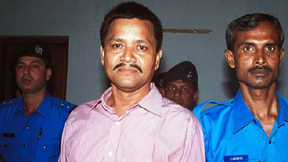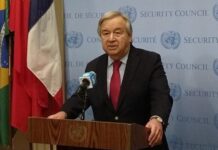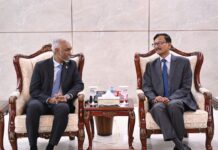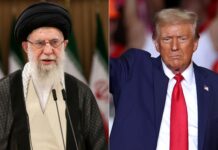 DHAKA: Bangladesh handing over to India top ULFA leader Anup Chetia was a reflection of close bilateral ties particularly in security areas, Home Minister Asaduzzaman Khan Kamal said here today as he hoped New Delhi will return a wanted Bangladeshi national jailed in West Bengal.
DHAKA: Bangladesh handing over to India top ULFA leader Anup Chetia was a reflection of close bilateral ties particularly in security areas, Home Minister Asaduzzaman Khan Kamal said here today as he hoped New Delhi will return a wanted Bangladeshi national jailed in West Bengal.
“It was an appropriate step on our part and we are ready to cooperate with India like this in future also in our common interest,” Kamal told PTI after Dhaka handed over Chetia to Indian authorities.
The return of the 48-year-old fugitive top separatist leader who was lodged in Bangladeshi jails for over 18 years came days after deportation of Mumbai underworld don Chhota Rajan from Indonesia and was kept secret until he reached India crossing at the northeastern Sylhet borders along with two associates who were lodged in Bangladeshi jail as well.
Asked if Dhaka expected any favor in return from Delhi after the resolution of the long-pending issue, the Minister said “we are seeking nothing in return as it was done as part of our mutual friendship and cooperation particularly in security areas”.
However, local media reports today quoted him as saying that a wanted mastermind of seven murders, Nur Hossain, who is now lodged in a West Bengal prison, would be returned to face justice much the same way Chetia was returned to India.
Approached for comments, Kamal – who had initially declined having any knowledge about Chetia’s return but later confirmed it – said: “We’ll receive him (Hossain) at the border just the way we left Anup Chetia there.”
The minister, however, said Chetia’s case should not be compared with that of Hossain and “we are not seeking to get (Hossain) back in return… it is not an issue of exchange”.
“We are ready to receive Hossain whenever he is returned by India… they (Indian authorities) may have some pending formalities which are delaying his return,” Kamal said.
Hossain is sought for masterminding the kidnap and murder of seven persons including a city councilor and a lawyer from the suburban river port city on April 27 last year while their bodies were retrieved later from the Shitalakya River.
He is also accused of bribing several officers of elite anti-crime Rapid Action Battalion (RAB), which is mainly commanded by army officers on deputation, for carrying out the murders and they are now being tried in a Bangladeshi court.
In Chetia’s case, Bangladesh had been saying since last year that the detained rebel leader was expected to be returned “very soon” in line with high-level talks between the two countries.
Officials earlier said Chetia would be returned under a special mechanism while he himself sought to be repatriated.
The ULFA’s founder general secretary sought political asylum in Bangladesh thrice in 2005, 2008 and in 2011 after Bangladesh police arrested him in December, 1997 and was subsequently handed down seven years of jail terms by two courts for cross-border intrusion, carrying fake passports and illegally keeping foreign currencies. Despite the expiry of his term, Chetia was kept in jail under a 2003 High Court directive asking authorities to keep him in safe custody until the government made a decision on his asylum prayer.
Bangladeshi Home Ministry earlier said Chetia’s issue was pending for a judicial decision as he sought Supreme Court intervention after Dhaka rejected his petition seeking asylum in Bangladesh after his 1997 arrest.
But officials said after staying in jail for 16 years, Chetia two years ago formally expressed his willingness to return to India and his petition was reviewed by the Home Ministry.
A Bangladeshi court last year handed down death penalty to another top fugitive ULFA leader, Paresh Barua, along with 13 Bangladeshis including two former ministers and two ex-army generals in the country’s biggest-ever weapon haul involving the separatist outfit.
Barua, ULFA’s military wing chief, however, was tried in absentia while the rest, mostly officials of the two intelligence agencies, faced the trial in person.
The verdict came nearly a decade after the “accidental” seizure of 10-truck loads of weapons to be supplied to the ULFA hideouts in India’s north-east through Bangladesh territory. The tribunal had earlier indicted 11 and nine of them faced the trial in person.
Several other top ULFA leaders, including their chief Arbind Rajkhowa, were reportedly arrested in Bangladesh and handed over to India in recent years but Dhaka officially confirmed none of these incidents. Despite the expiry of his term, Chetia was kept in jail under a 2003 High Court directive asking authorities to keep him in safe custody until the government made a decision on his asylum prayer.
Bangladeshi Home Ministry earlier said Chetia’s issue was pending for a judicial decision as he sought Supreme Court intervention after Dhaka rejected his petition seeking asylum in Bangladesh after his 1997 arrest.
But officials said after staying in jail for 16 years, Chetia two years ago formally expressed his willingness to return to India and his petition was reviewed by the Home Ministry.
A Bangladeshi court last year handed down death penalty to another top fugitive ULFA leader, Paresh Barua, along with 13 Bangladeshis including two former ministers and two ex-army generals in the country’s biggest-ever weapon haul involving the separatist outfit.
Barua, ULFA’s military wing chief, however, was tried in absentia while the rest, mostly officials of the two intelligence agencies, faced the trial in person.
The verdict came nearly a decade after the “accidental” seizure of 10-truck loads of weapons to be supplied to the ULFA hideouts in India’s north-east through Bangladesh territory. The tribunal had earlier indicted 11 and nine of them faced the trial in person.
Several other top ULFA leaders, including their chief Arbind Rajkhowa, were reportedly arrested in Bangladesh and handed over to India in recent years but Dhaka officially confirmed none of these incidents.–PTI






